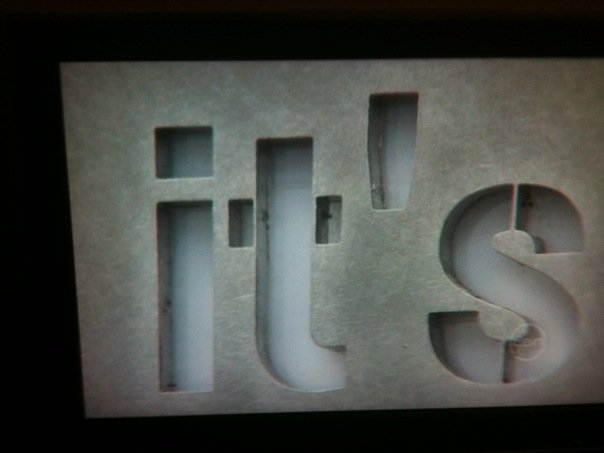Tag: grammar nazis
Style Guide: to infinitives and beyond
The Chicago Manual of Style is one of the seminal style guides in the world. If you’ve got a grammatical question or are pondering an obscure rule governing the use of the English language (like whether or not to capitalise the E in english, or the names of birds in a tourism brochure) then you should check it out. Especially interesting is the FAQ/Q&A section.
On split infinitives:
“CMOS has not, since the thirteenth edition (1983), frowned on the split infinitive. The fifteenth edition now suggests, to take one example, allowing split infinitives when an intervening adverb is used for emphasis (see paragraphs 5.106 and 5.160). In this day and age, it seems, an injunction against splitting infinitives is one of those shibboleths whose only reason for survival is to give increased meaning to the lives of those who can both identify by name a discrete grammatical, syntactic, or orthographic entity and notice when that entity has been somehow besmirched. Many such shibboleths—the en dash, for example—are worthy of being held onto… euphony or emphasis or clarity or all three can be improved by splitting the infinitive in certain situations. It’s one of the advantages of a language with two-word infinitives.”
Cop that one grammar nazis…
Why you shouldn’t be the grammar police, and how to get away with your mistakes
The correct response, when confronted with someone correcting your grammar, syntax or spelling, is an appeal to authority (Shakespeare) with a simultaneous request for their contradictory evidence from a superior authority (confident in the knowledge there is no greater authority on the written word). This may not work when it comes to obvious spelling or punctuation mistakes – but it should help keep the wolves at bay.
I have two slightly contradictory pet peeves. On one hand, I hate reading bad grammar – particularly their/there/they’re, its/it’s and your/you’re. This is mostly because I hate making the mistake myself. I feel so incredibly stupid when an error is pointed out. I think, deep down, that I am a perfectionist. On the other hand – I hate when people point out bad grammar – mine or otherwise. Nothing raises my online hackles more than the superiority of a grammar pedant. I tried being one once. It didn’t make me feel nice. I don’t know how others can do it – it must come from hating bad grammar more than one hates appearing like a complete and utterly superior prig.
If knowing how stupid you feel when someone points out your error does not stop you pointing out the errors of others (sticks, logs and all that jazz), and if you’re so sure that you will never make your own scorn worthy mistake so that you run no risk of hypocrisy, then perhaps you should continue reading – and remember that people actually think less of you when you correct your/their friends in public. Not more.
I will say that I think the exception to this rule is when an institution makes a mistake – and the closer the institution is to the rules of grammar the funnier it is. When governments have grammar style guides and stuff up bridge inscriptions that is funny. When we laugh at Chinese translators mangling English while making their country more open to visitors that is cultural imperialism.
I’ve read a couple of articles today courtesy of Twenty Two words that helpfully reminded me that being a “Grammar Nazi” does not make one superior – nor does it actually make somebody a better writer. Imagine how the very Bard himself would be remembered if he had bowed to the pressure of the grammar pedants of his day.
Firstly, grammar pedants speak too early too often and provide no evidence for their claims. They expect us to sit idly by and accept their views on the movable feast of language while providing not a skerrick nor shred of corroboration for their claims. Up with this I shall not put.
Here’s an article that compares grammar experts with etiquette experts who make claims and then move the goal posts when someone disagrees.
This article provides recourse for people like me who want to rid themselves of pesky comments from friends who suffer from badgrammaritis (symptoms include the inability to let bad grammar pass unpunished).
We have all heard admonitions at some point or other that the word unique cannot be modified — a thing is either unique or it is not. This would be considerably more convincing if it were not so obviously untrue, as people modify unique quite frequently, and have done so for a long time. Through the magic of Google Books you can now search through enormous numbers of books and magazines from the 19th century and see literally hundreds of writers who use more unique, less unique and even that bugbear of the purists, somewhat unique.
(And speaking of literally, the next time someone tells you that it cannot be used to mean aught but literal, you might point out that it has been used in various figurative and nonliteral senses for hundreds of years, by such literary figures as Jane Austen, Charles Dickens and Richard Milhous Nixon.)
The article points out that most grammar conventions and corrections are given without any sense of evidence – in fact, on Facebook where both bad grammar and pedantry runs rampant, corrections are given with a sense of superior satisfaction but no reference to any rules or conventions that actually back up the criticism.
The erudite conclusion from the NY Times article is proof that a predilection for pedantry does not give you the exclusive rights to good writing. It’s today’s rule breakers who become tomorrow’s rule makers. To use an analogy – pedants are the engineers of the writing world while the rest of us are the artistes – the architects and interior designers, the painters, the landscapers and the Feng Shui consultants.
So I say outpedant the pedants, and allow yourself to gluttonously revel in the linguistic improprieties of yore as you familiarize yourself with the nearly unique enormity of the gloriously mistaken heritage that our literature is comprised of. For those of you keeping score at home, that last sentence contained a verbal noun, a split infinitive, an improper -ize, an inflectional comparative, a blatantly misleading word choice, at least one example of catachresis, an unnecessarily passive construction — and it ended with a preposition. All of which I’m willing to bet appear in Shakespeare.
Things that make me grumpy!
I have a pet hate. I hate a particular sub-species of grammar nazi. Well, a couple of sub-species actually.*
I hate it when I write perfectly parsed, syntaxed and phrased quotes to be included in a third party’s media release and they come back changed.
I especially hate it when that change includes the addition of an exclamation mark, or a change of spelling (program v programme) because your style guide is stuck in the mother country.
You may think you’re a better writer than me, you may be a better writer than me – but don’t ask for my help and then bastardise my quotes with awful punctuation.
If you do this I will laugh at you when nobody comes to your press conference – even though you waste almost an hour of my CEO’s time.
That is all.
*I also have a mild disdain for the Grammar SS, those Grammar Nazis who run around pulling people up with a public rebuke for a grammatical error. If it’s an issue for you at least have the courtesy to raise a mistake in private rather than trumpeting your grammatical superiority via a snarky comment. It may be that the mistake is an innocent typo.
To ‘postrophe, or not to apostrophe
Continuing in my campaign for better apostrophe use comes this news story about a man in England who has taken the unusual path of adding apostrophes to signs.
The most significant problems with apostrophe use involve the overuse – but this guy wants to ensure they don’t die out altogether…

“The 62-year-old’s defence of the apostrophe comes after Birmingham council announced it would scrap the punctuation from council signs for the sake of ‘simplicity’.”
Mr Gatward, who served for four years in the Gordon Highlanders in the 1960s, is not just a campaigner for the apostrophe.He will not join the ‘five items or less’ queue at the supermarket, in protest that the sign should read ‘five items or fewer’.

He also gets annoyed when people-neglect the ‘Royal’ in ‘Royal Tunbridge Wells’, and was vexed when he saw a major chain store advertising sales with signs saying ‘until stocks last’ rather than ‘while stocks last’.
‘I fought for the preservation of our heritage and our language but some people seem happy to let that go. I’m not,’ he said.
Read more here…
Sadly, Brisbane’s council has the opposite problem and probably should be following the flow chart. Its error is set in stone.
Here’s a photo dad snapped on his iPhone of a new footbridge.

It’s in the sentence:
“Although many changes have occurred along the river, it’s spiritual significace endures.”
11 great grammar tips
As Guthers points out, in his comment on this post, the site that particular little clarification came from is incredibly useful.
It’s chock full of common grammatical errors you should avoid (and the rationale behind including them) if you don’t want to look like an idiot.
Here are ten helpful tips (and pet hates of mine)…
- Apostrophes
- Moot v Mute point
- Affect v Effect
- New lease of life v New lease on life
- On having and eating cakes
- Regardless v Irregardless (a mistake I made the other day)
- Commas – particularly the Oxford Comma the final comma in a list (before the and)
- Hyphenation
- Hyphens and Dashes
- Lite/nite/thru
- Capitalising job titles
And grammatical fallacies that will help you avoid looking like a goose when you correct other people.
Grammar tips from Strongbad

I must confess that I haven’t watched a StrongBad email in a long time (possibly three years) I look forward to a day or two spent catching up on the archives. But StrongBad has been indelibly itched into my psyche whenever I’m trying to decide where to use apostrophes… particularly in the case of its v it’s.
Here’s a little song that will help you remember that when its is possessive it’s just i-t-s and when it’s a contraction it’s “i-t apostrophe s”.
That’s from this little collection of grammar songs.
I think I’ve posted this before (some time ago) – but it continues to be useful.
Grammar Nazis and homophones

Yeah. Take that you “your/you’re”, “its/it’s” and “there/their/they’re” grammar nazis.
Everybody makes mistakes. Especially with homophones. Maybe words that are homophones should have little pink triangles inserted into the spelling. That’d keep you Nazis happy. Wouldn’t it. Anyone who dares to write things online should be sent to “concentration” camp…
Grammar Nazis
There are a couple of subtitled swear words here – but this is funny. And worth a watch. Does a video comparing grammar pedants with Hitler break Godwin’s Law?